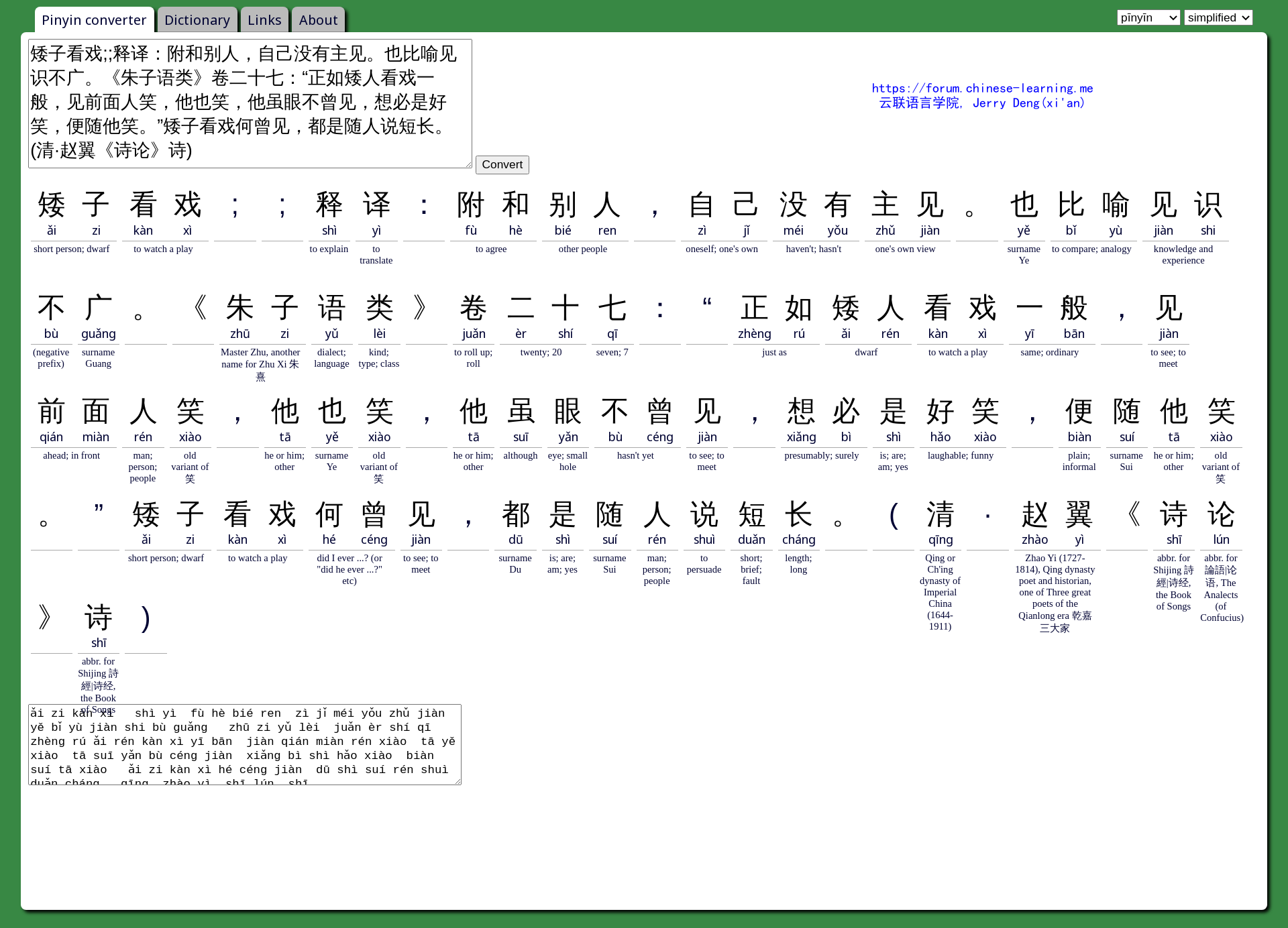
Show Pīnyīn
释译:附和别人,自己没有主见。也比喻见识不广。
《朱子语类》卷二十七:“正如矮人看戏一般,见前面人笑,他也笑,他虽眼不曾见,想必是好笑,便随他笑。”
矮子看戏何曾见,都是随人说短长。(清·赵翼《诗论》诗)
例句
shìyì : fùhè biéren , zìjǐ méiyǒu zhǔjiàn 。 yě bǐyù jiànshi bùguǎng 。
《 zhūziyǔ lèi 》 juǎn èrshíqī : “ zhèngrú ǎirénkànxì yībān , jiàn qiánmiàn rénxiào , tā yě xiào , tā suīyǎn bùcéng jiàn , xiǎngbì shì hǎoxiào , biàn suí tā xiào 。 ”
ǎizikànxì hécéng jiàn , dū shì suírén shuō duǎncháng 。 ( qīng zhàoyì 《 shīlùn 》 shī )
lìjù

Interpretation: Go along with others, but have no own opinion. It is also a metaphor for lack of knowledge.
Volume 27 of "Zhu Zi Yu Lei": "Just like a dwarf watching a play, when he sees the person in front of him laughing, he also laughs. Although he has never seen it, it must be funny, so let him laugh."
The dwarf has never seen it in a theater before, and he always talks about it according to others. (Qing Zhao Yi's "Poetry" poem)
Example sentences
.
Interpretación: Ir junto con los demás, pero no tener una opinión propia. También es una metáfora de la falta de conocimiento.
Volumen 27 de "Zhu Zi Yu Lei": "Al igual que un enano viendo una obra de teatro, cuando ve a la persona frente a él riendo, también se ríe. Aunque nunca lo ha visto, debe ser divertido, así que déjalo reír ."
El enano nunca la ha visto en un teatro y siempre habla de ella según los demás. (Poema "Poesía" de Qing Zhao Yi)
oraciones de ejemplo
.
Interprétation : Accompagner les autres, mais n'avoir aucune opinion personnelle. C'est aussi une métaphore du manque de connaissances.
Volume 27 de "Zhu Zi Yu Lei": "Tout comme un nain qui regarde une pièce de théâtre, quand il voit la personne devant lui rire, il rit aussi. Bien qu'il ne l'ait jamais vu, ça doit être drôle, alors laissez-le rire ."
Le nain ne l'a jamais vu au théâtre, et il en parle toujours d'après les autres. (Poème "Poésie" de Qing Zhao Yi)
Exemples de phrases
.
解釈: 他の人と一緒に行きますが、自分の意見はありません。それはまた、知識の欠如の比喩でもあります。
『朱子玉雷』第27巻:「芝居を見ている小人のように、目の前の人が笑っているのを見ると、彼も笑う。見たことがないけど、きっと面白いから笑わせて」 ."
ドワーフはこれまで劇場でそれを見たことがなく、他の人によると彼はいつもそれについて話しています。 (清昭義の「詩」の詩)
例文
.
Interpretation: Schließe dich anderen an, habe aber keine eigene Meinung. Es ist auch eine Metapher für mangelndes Wissen.
Band 27 von „Zhu Zi Yu Lei“: „Genau wie ein Zwerg, der sich ein Theaterstück ansieht, lacht er auch, wenn er die Person vor sich lachen sieht. Obwohl er es noch nie gesehen hat, muss es lustig sein, also lass ihn lachen ."
Der Zwerg hat es noch nie in einem Theater gesehen, und er spricht immer darüber, wie andere es sagen. (Qing Zhao Yis „Poesie“-Gedicht)
Beispielsätze
.